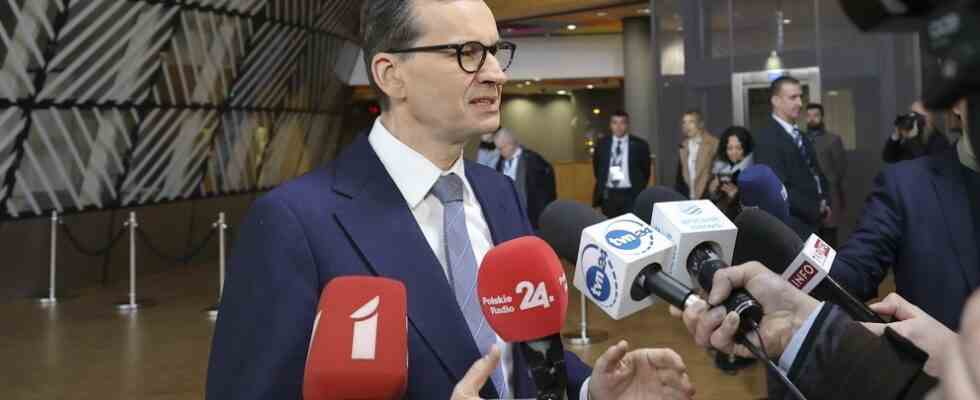Does he want to reintroduce the death penalty in Poland? Polish Prime Minister Mateusz Morawiecki said in an online public opinion poll on Monday evening: “I am a supporter of the death penalty.” He knows that this is also incompatible with the Christian world view, but he still thinks it is appropriate for particularly serious crimes. Government spokesman Piotr Müller had to clean up afterwards and explained that this was all only theoretical and meant, for example, in the case of war crimes. Of course we know that the death penalty is not accepted in the EU.
What Morawiecki’s well-aimed provocation means above all: The 2023 election campaign has begun. In either October or early November, Poles will elect a new House of Representatives (Sejm) and a new Senate. The exact date must be announced by summer at the latest. The incumbent Sejm began its work on November 12, 2019.
The EU blocked billions of euros for Poland
This election will be decisive not only for Poland, but for the entire EU. Under a government of today’s opposition, a return to the rule of law as well as to the values and principles of the EU would be expected. The current government, on the other hand, is moving further and further away from Brussels. The EU and the money to be expected from it is also one of the most important election campaign issues, and the Corona aid of 22.5 billion euros is still blocked for Poland.
The election campaign is actually long gone. Opposition leader Donald Tusk from the Christian conservative party Platforma Obywatelska (PO) regularly meets with potential voters across the country. The chairman of the PiS party, Jarosław Kaczyński, has also been traveling through Poland for months and repeatedly causes a stir. For example, with his accusations against women who didn’t want to or couldn’t give birth to children because they drank too much alcohol. Men simply tolerate a lot more, he lectured.
Opposition leader Donald Tusk, here at a pro-European demonstration in Warsaw last October.
(Photo: Magdalena Chodownik/Getty Images)
Tusk, Charles Michel’s predecessor as President of the European Council, is denigrated as either a friend of the Germans or the Russians, and the ruling party sees no accusation as too absurd. Commentators critical of the government in the media and in politics also like to grab the big cutlery and compare the PiS government with the Kremlin.
So far, however, the opposition PO has offered little content, concentrating mainly on allegations against the PiS, and regularly calculating how many billions of euros in EU funds the government and its policies are costing the country and its residents. For its part, the PiS prefers to talk about demands for reparations from Germany, which the federal government has now rejected in a diplomatic note. The refusal to negotiate the payments demanded by his government shows an absolutely disrespectful attitude towards Poland and the Polish people, said Arkadiusz Mularczyk, Poland’s deputy foreign minister.
Most important election since 1989?
A high turnout of at least 67 percent is already expected in a survey conducted by the magazine Polityka A third of respondents said the upcoming election was more important than the June 1989 election, the first at least partially free election since the Second World War, which Solidarność ultimately won.
There is still a long way to go until autumn. Polls put Tusk’s camp first, whose PO forms the Koalicja Obywatelska together with two smaller parties, and sometimes the United Right, i.e. the PiS with its far-right government partner Solidarna Polska. Both camps are always around 30 percent.
Opponents of the government had already predicted during the presidential election in the summer of 2020 that there would be a sustained change in opinion before the parliamentary elections in 2023. At that time, President Andrzej Duda was able to defend his position rather narrowly against Warsaw Mayor Rafał Trzaskowski, also a PO member.
Sociologists such as Jacek Kucharczyk of the Institute of Public Affairs in Warsaw believe that Polish society is already far ahead of narrow-minded government policies in its liberal views. Liberal forces are placing a lot of hope in young voters, who have little use for the United Right’s hostile national policy of isolation.
Poland’s civil society also gives them cause for hope. There are those who demonstrate every evening in the center of Warsaw in front of the headquarters of the state television station TVP for a free media landscape. The women and men who stand up for the right to abortion, which is de facto forbidden in Poland. And the many volunteers who organize humanitarian aid for refugees coming from Belarus through the forests and moors in eastern Poland. Aid to the millions of women and children fleeing the war in Ukraine to Poland was also largely organized by volunteers and NGOs.

